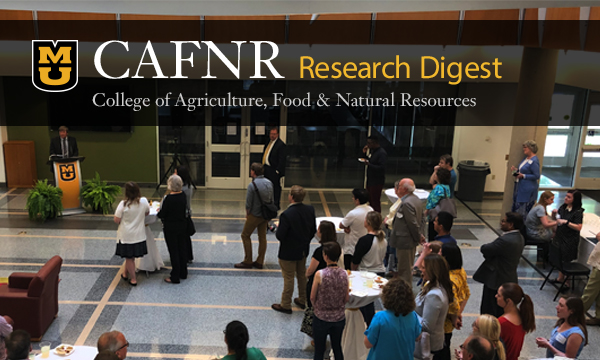|
Lisa Webb Wins 2018 U.S. Geological Survey, Cooperative Fish and Wildlife Research Unit Scientific Excellence Award
Lisa Webb, cooperative associate professor in the School of Natural Resources, has received the U.S. Geological Survey, Cooperative Fish and Wildlife Research Unit Scientific Excellence Award for 2018. This award is given to one Cooperative Research Unit faculty member nationwide (out of about 85 scientists) and is based on research productivity, student engagement and placement, and collaboration with cooperators. In addition to Webb’s research productivity (more than nine publications this year), her students and postdocs have recently received jobs throughout the country with organizations and agencies such as Ducks Unlimited, Wisconsin Department of Natural Resources, the University of Missouri, and the California Department of Pesticide Regulation. Her nomination packet included letters of support from the Missouri Department of Conservation, The U.S. Fish and Wildlife Service, Nebraska Game and Parks Commission, and The Nature Conservancy. These letters indicate how Webb’s research is being used by their agencies to benefit wetland management, endangered species and waterfowl harvest regulations. She was surprised with the award June 17 when meeting with the Missouri Department of Conservation.
CAFNR faculty members present at UM System Summit
Three CAFNR faculty members were part of the recent “Road to Resilience – Disaster to Social and Environmental Resilience” Summit presented by the University of Missouri System. This research summit showcased interdisciplinary work from all four UM System universities and provided a forum to stimulate system-wide collaboration and innovation around recovering from and preparing for disasters. CAFNR faculty presenting included Felix Fritschi, C. Alice Donaldson Professor in Bioenergy Crop Physiology and Genetics, Plant Sciences; Jere Gilles, Associate Professor, Rural Sociology; and Damon Hall, Assistant Professor, School of Natural Resources.
CAFNR faculty members have received the following recent grants (listed by Principal Investigator):
Alba Argerich, Lakes of Missouri Volunteer Program, 4/1/2019 – 3/31/2020, $165,276, Missouri Department of Natural Resources
Paula Chen, Investigating mTORC1 Activation Mechanisms and Its Role in the Viability of Early Porcine Embryos, 6/1/2019 – 5/31/2021, $95,745, National Institute of Food and Agriculture
Christine Elsik, Development of MaizeMine, a Flexible Data Warehouse and Analysis System for Retrieval of Customized Datasets from the MaizeGDB Database, 5/1/2016 – 5/31/2020, $149,926, Agricultural Research Service
Harriet Fitzgerald, Investigations into How Uterine Glands Impact Human Pregnancy Establishment, 6/1/2019 – 5/31/2020, $52,000, The Lalor Foundation
Felix Fritschi, Foundations for Soybean in Africa, 5/1/2019 – 5/1/2020, $8,350, University of Illinois
Karl Kerns, Machine Learning Approach to Elucidate the Relationship of the Sperm Zn Signature to Boar & Bull Fertility and Creating an Improved Extender for Zn Signature Management, 6/1/2019 – 5/31/2021, $165,000, National Institute of Food and Agriculture
Dae-Young Kim, Designing and Conducting a Tourism Development Survey and Economic Impact Study for the True/False Festival, 12/15/2017 – 12/31/2019, $4,238, City of Columbia, Missouri
Benjamin Knapp, Documenting the extent and spatial distribution of woody invasive plants on Baskett Wildlife Research Center and the Southwestern Project Area of the Cedar Creek Ranger District – Mark Twain National Forest, 6/1/2019 – 5/31/2020, $6,998, Forest Service
Kiruba Krishnaswamy, High Oleic Soy-based Instant Powder through Spray Drying: Value-Added Product, 7/1/2019 – 6/30/2020, $32,134, Missouri Soybean Merchandising Council
Rebecca North, Statewide Lakes Assessment Project, 4/1/2019 – 3/31/2020, $193,204, Missouri Department of Natural Resources
Andrew Scaboo, Foundations for Soybean in Africa, 3/31/2019 – 3/31/2020, $11,970, University of Illinois
Reid Smeda, Chemical Materials Trial/Protocols NA19T8B004H; and NA19T8B005H, 6/1/2019 – 6/30/2020, $10,500, Dow AgroScience LLC
Michael Stambaugh, Evaluating the use of prescriptive grazing and fire for the management and maintenance of Ozark woodlands, 7/2/2018 – 9/30/2020, $12,000, Forest Service
Xi Xiong, 16ESP009/Water mgmt PoC/Putting green field trials/Plant health RGAA0070, 5/17/2019 – 5/16/2020, $10,000, Bayer CropScience LP
Provided by the MU Office of Research
|
